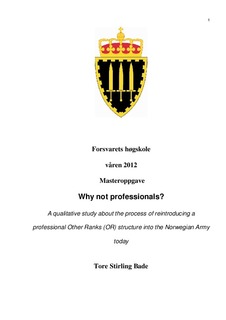Why not professionals? A qualitative study about the process of reintroducing a professional Other Ranks (OR) structure into the Norwegian Army today
Master thesis
Permanent lenke
http://hdl.handle.net/11250/100060Utgivelsesdato
2012Metadata
Vis full innførselSamlinger
- Masteroppgaver [466]
Sammendrag
The issue of a professional OR structure in the Norwegian Armed Forces has been controversial for a number of years. The disbandment which was a political decision came about largely due to contention over ideology and class perspectives. The political involvement resulted in a prevailing perception within the Armed Forces themselves that reversing these changes was considered to be a task of insurmountable proportions. The lack of a so-called specialist structure was acceptable as long as the Norwegian Army was producing soldiers for a mobilisation Army.
With the end of the Cold War and a lengthy engagement in Afghanistan, the world changed and the need for a professional OR structure in the Norwegian Army gradually resurfaced. For the past three years, the Chief of Staff of the Norwegian Army has endeavoured to re-introduce the professional OR structure. This has been a time-consuming process that has required a great deal of effort, and which has yet to see tangible results. The overarching goal with this research has been to identify why that may be the case. The research is therefore based on the simple question: why does the Norwegian Army not have a professional Other Ranks structure today?
This thesis then examines the process and the various forces of influence that appear to be playing a hand. Through qualitative research, the thesis identifies a series of factors that appear to be influencing the overall outcome to varying degrees. Research shows that political ideology is far less an obstacle than was the case previously. Other factors identified as been part of the process include the idea of officership as a profession, which for various reasons has been less prevalent as a concept until recent years. The dimension of ownership and stakeholders has also been important, as has timing and the need for a more holistic approach. A lack of implementation of the existing concept has also played a role, though the perspective of costs has not yet done so directly. In conclusion it now appears that the change will take place, though it is premature to say when this will happen.
